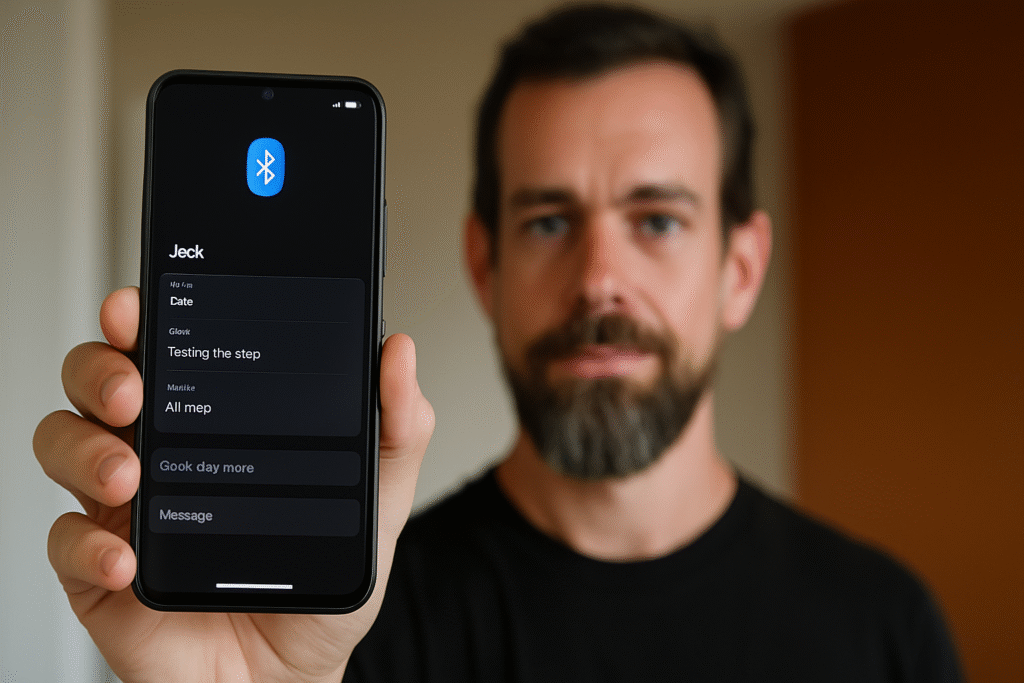In a world dominated by internet reliant platforms, Jack Dorsey’s Bluetooth messaging app Bitchat has landed on the iOS App Store with a bold proposition: offline messaging without Wi-Fi or cellular data. Built over a weekend by Twitter and Block co founder Jack Dorsey himself, Bitchat uses Bluetooth mesh networking to enable hyper local, real time chat a technological and social experiment in rethinking how we connect.
The Idea Behind Bitchat: Minimalism Meets Connectivity
Unlike the bloated apps we’re accustomed to, Bitchat strips messaging down to its core. There’s no login, no user profiles, and no data collection. The moment you open the app, you enter a chatroom populated by nearby users if any are in Bluetooth range, which typically extends about 100 meters.
This hyper localized approach means Jack Dorsey’s Bluetooth messaging app doesn’t rely on the internet. Instead, it creates a peer to peer network by bouncing messages across connected users’ devices, similar to how fire spreads in dry grass quietly, quickly, and without central oversight.
A Use Case Rooted in Freedom and Decentralization
This is not just a novelty or a tech stunt. Dorsey’s decision to create Bitchat stems from a growing concern over centralization and digital surveillance. In an era when big tech controls vast communication channels, Jack Dorsey’s Bluetooth messaging app represents a rebellion a means of direct contact that can’t be censored, tracked, or monetized.
Bitchat was built to explore a world where people can talk freely, without needing the permission of a telecom provider or big tech gatekeeper, said Dorsey in a tweet shortly after its release.
Offline Messaging in Crises
The concept of Bluetooth based messaging isn’t entirely new. During the 2019 Hong Kong protests, activists used an app called Bridgefy, which also ran on Bluetooth mesh networks, to coordinate without relying on mobile internet which was being monitored and occasionally shut down.
Similarly, in regions like Puerto Rico after Hurricane Maria and parts of California during wildfires, traditional communication networks failed, and decentralized alternatives like mesh networks proved vital. Bitchat joins this lineage but adds a Dorsey esque touch open source simplicity and privacy first design.
What Tech Analysts Are Saying
Dr. Cynthia Reeves, a tech sociologist from MIT, views Bitchat as a fascinating return to analog style proximity based interaction in a hyper connected age. It’s ironic and beautiful, she says, that someone who helped architect the modern social network is now building tools to take us away from it. Jack Dorsey’s Bluetooth messaging app doesn’t just question our dependence on the cloud it challenges the idea of always on, always tracked communication.
Meanwhile, Graham Silverman, a Bluetooth mesh developer, highlights the cleverness of Bitchat’s implementation. Bluetooth mesh isn’t just for IoT devices anymore. With apps like Bitchat, we’re seeing it evolve into people to people technology something I never thought we’d see at scale.
What Early Users Are Saying
Despite being less than a month old, early adopters are praising the app’s minimalist design and unique functionality. Jordan, a backpacker in Colorado, shared, We were hiking through Estes Park and out of network range. I opened Bitchat and ended up chatting with three other hikers nearby. It felt like an old school walkie talkie spontaneous and fun.
In urban environments, the experience is different. Leila, a college student in downtown Chicago, noted, It’s weirdly voyeuristic. You’re suddenly part of a tiny public forum that vanishes as quickly as it appears. I love it and it freaks me out.
How Bitchat Actually Works
From a technical standpoint, Bitchat utilizes Bluetooth Low Energy (BLE) mesh topology. Each device acts as a node, relaying data between connected devices, creating a flexible and scalable system. There’s no central server or cloud database. Messages are not stored, tracked, or backed up.
The app is truly ephemeral, in line with Dorsey’s growing advocacy for decentralization. This places Jack Dorsey’s Bluetooth messaging app at the intersection of privacy, minimalism, and decentralized architecture, potentially influencing future designs in offline first applications.
Future Outlook: A Toy or a Tool?
Will Bitchat scale? That depends. Its utility is highest in dense environments festivals, protests, subways, universities. If adopted by niche communities or open source developers, it could evolve into a critical alternative communication tool. However, adoption will likely hinge on how Dorsey and the open source community handle updates, Android support, and user education.
There’s also the looming question: will Apple or regulators limit such apps if they become too powerful? Only time will tell. In a hyper surveilled, algorithmically driven era, Jack Dorsey’s Bluetooth messaging app Bitchat feels almost poetic a quiet whisper against the roar of big tech. It doesn’t want your data. It doesn’t care who you are. It simply wants you to talk to the person next to you.
It’s a return to something lost human proximity, spontaneous conversation, and ephemeral presence. And perhaps, that’s exactly what the digital world needed.

